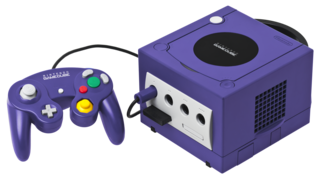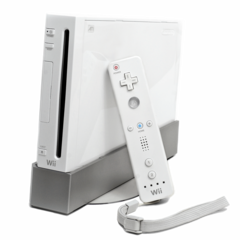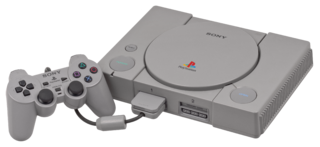This page describes all the platforms that have a rerecording emulator that is approved for site submission.
Nintendo
Nintendo Entertainment System / Famicom


The Nintendo Entertainment System (also abbreviated as NES or simply called Nintendo) is an 8-bit video game console that was released by Nintendo in North America during 1985, in Europe during 1986 and Australia in 1987. In most of Asia, including Japan (where it was first launched in 1983), China, Vietnam, Singapore, the Middle East and Hong Kong, it was released as the Family Computer (ファミリーコンピュータ Famirī Konpyūta?), commonly shortened as either the Famicom (ファミコン Famikon?), or abbreviated to FC
- System ID: NES
- Approved rerecording emulators:
- Movies-NES
Famicom Disk System
 In 1986, Nintendo released the FDS in Japan, a type of floppy drive that used a single-sided, proprietary 2" disk and plugged into the cartridge port. It contained RAM for the game to load into and an extra FM synthesis sound chip.
In 1986, Nintendo released the FDS in Japan, a type of floppy drive that used a single-sided, proprietary 2" disk and plugged into the cartridge port. It contained RAM for the game to load into and an extra FM synthesis sound chip.
- System ID: FDS
- Approved rerecording emulators:
- FCEUX
- Nestopia
- Mednafen
- VirtualNES (deprecated)
- Famtasia (depracted)
- Movies-FDS
Super Nintendo Entertainment System / Super Famicom
 The Super Nintendo Entertainment System (also known as the Super NES, SNES or Super Nintendo) is a 16-bit video game console that was released by Nintendo in North America, Europe, Australasia (Oceania), and South America between 1990 and 1993. In Japan and Southeast Asia, the system is called the Super Famicom (スーパーファミコン, officially adopting the abbreviated name of its predecessor, the Family Computer), or SFC for short. In South Korea, it is known as the Super Comboy (슈퍼 컴보이) and was distributed by Hyundai Electronics.
The Super Nintendo Entertainment System (also known as the Super NES, SNES or Super Nintendo) is a 16-bit video game console that was released by Nintendo in North America, Europe, Australasia (Oceania), and South America between 1990 and 1993. In Japan and Southeast Asia, the system is called the Super Famicom (スーパーファミコン, officially adopting the abbreviated name of its predecessor, the Family Computer), or SFC for short. In South Korea, it is known as the Super Comboy (슈퍼 컴보이) and was distributed by Hyundai Electronics.
- System ID: SNES
- Approved rerecording emulators:
- Movies-SNES
Nintendo 64
 The Nintendo 64 (ニンテンドウ64 Nintendō Rokujūyon), often referred to as N64, is Nintendo′s third home video game console for the international market. Named for the 64-bit CPU, it was released in June 1996 in Japan, September 1996 in North America, March 1997 in Europe and Australia, September 1997 in France and December 1997 in Brazil.
The Nintendo 64 (ニンテンドウ64 Nintendō Rokujūyon), often referred to as N64, is Nintendo′s third home video game console for the international market. Named for the 64-bit CPU, it was released in June 1996 in Japan, September 1996 in North America, March 1997 in Europe and Australia, September 1997 in France and December 1997 in Brazil.
- System ID: N64
- Approved rerecording emulators:
- Movies-N64
Nintendo Gamecube
 The Nintendo GameCube (ニンテンドーゲームキューブ), officially abbreviated to NGC in Japan and GCN in other regions, is a sixth generation video game console released by Nintendo on September 15, 2001 in Japan, November 18, 2001 in North America, May 3, 2002 in Europe, and May 17, 2002 in Australia. It was the successor to the Nintendo 64.
The Nintendo GameCube (ニンテンドーゲームキューブ), officially abbreviated to NGC in Japan and GCN in other regions, is a sixth generation video game console released by Nintendo on September 15, 2001 in Japan, November 18, 2001 in North America, May 3, 2002 in Europe, and May 17, 2002 in Australia. It was the successor to the Nintendo 64.
- System ID: NGC
- Approved rerecording emulators:
Wii
 The Wii is a home video game console released by Nintendo on November 19, 2006. As a seventh-generation console, the Wii primarily competes with Microsoft's Xbox 360 and Sony's PlayStation 3. Nintendo states that its console targets a broader demographic than that of the two others. As of April 2012, the Wii leads the generation over the PlayStation 3 and Xbox 360 in worldwide sales, and in December 2009 broke the record for best-selling console in a single month in the United States.
The Wii is a home video game console released by Nintendo on November 19, 2006. As a seventh-generation console, the Wii primarily competes with Microsoft's Xbox 360 and Sony's PlayStation 3. Nintendo states that its console targets a broader demographic than that of the two others. As of April 2012, the Wii leads the generation over the PlayStation 3 and Xbox 360 in worldwide sales, and in December 2009 broke the record for best-selling console in a single month in the United States.
- System ID: Wii
- Approved rerecording emulators:
- Movies-Wii
Sony
PlayStation
 The PlayStation (プレイステーション, officially abbreviated as PS; unofficially referred to as the PSX or PS1) is a 32-bit fifth-generation video game console first released by Sony Computer Entertainment in Japan on December 3, 1994. The PlayStation was the first of the PlayStation series of consoles and handheld game devices. In 2000, a re-designed, "slim" version was released, called the PSone, replacing the original grey console, and also being renamed to avoid confusion with its successor, the newly-released PlayStation 2.
The PlayStation (プレイステーション, officially abbreviated as PS; unofficially referred to as the PSX or PS1) is a 32-bit fifth-generation video game console first released by Sony Computer Entertainment in Japan on December 3, 1994. The PlayStation was the first of the PlayStation series of consoles and handheld game devices. In 2000, a re-designed, "slim" version was released, called the PSone, replacing the original grey console, and also being renamed to avoid confusion with its successor, the newly-released PlayStation 2.
- System ID: PSX
- Approved rerecording emulators:
- PSXjin
- PCSX-rr
- Movies-PSX